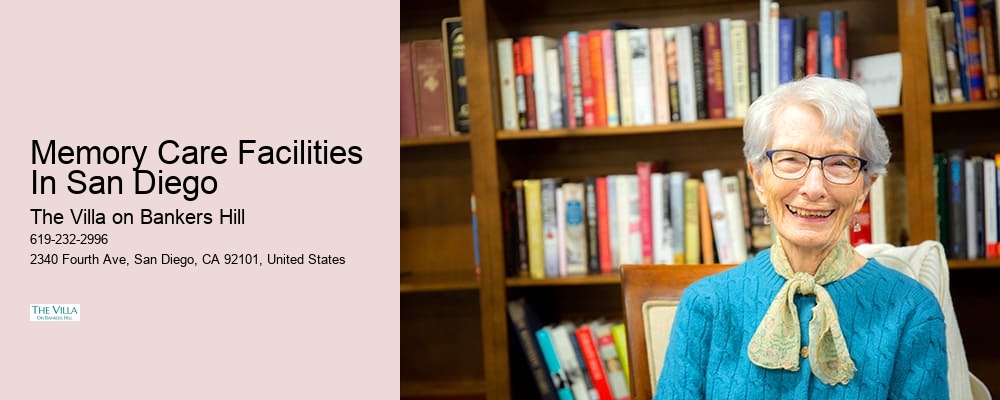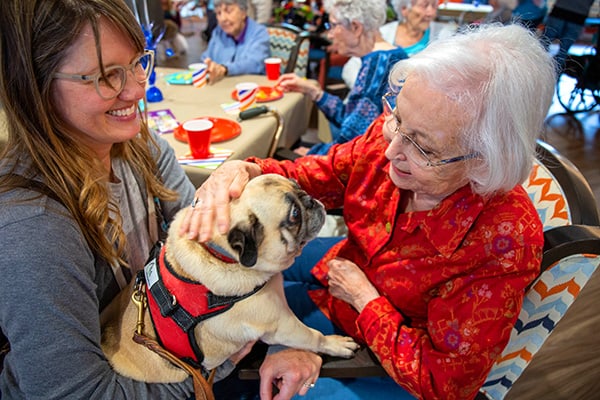

The Villa on Bankers Hill has earned recognition as a Top San Diego Assisted Living Community by the San Diego Union-Tribune. Located two blocks from Balboa Park, our stunning assisted living and memory care community offers diabetic care, medication management, and support with daily activities. Families value our home-like ambiance, complete with private apartments, a 24-hour nursing staff, and a secure memory care section.

When exploring memory care facilities in San Diego, the level of specialized care and the expertise of the staff should be a top priority. A facility that excels in memory care will have a compassionate, well-trained team that is knowledgeable about dementia and Alzheimer's disease. Look for certifications or training programs that the staff has completed, which ensures they are equipped with current best practices to manage cognitive impairments effectively. The ratio of caregivers to residents is also crucial; a lower ratio means more personalized attention and better supervision for your loved one.
The design of the facility plays a significant role in promoting independence while ensuring safety for individuals with memory issues. Secure outdoor spaces, such as gardens or walking paths, allow residents to enjoy nature without risk of wandering off-property. Inside, look for an environment that minimizes confusion and overstimulation—clear signage, ample lighting, and simple layouts assist residents in navigating their living space comfortably. Additionally, check whether there are engaging activities tailored to various cognitive levels to keep residents active both mentally and physically.
Each individual's experience with memory loss is unique; therefore, personalized care plans are essential when selecting a memory care facility. Ensure that the assessment process is thorough so that all health conditions, preferences, routines, and interests are taken into account when creating an individualized plan. The plan should be flexible enough to adapt as the resident's needs change over time. Moreover, family involvement should be encouraged—a good facility will often provide updates on progress and include family members in care planning discussions.
Caring for someone with dementia goes beyond what happens within the walls of a facility—it affects entire families who need support too. Facilities that offer educational resources, support groups or counseling services demonstrate an understanding of this dynamic. These resources can help families cope with their loved ones' conditions while fostering a collaborative approach to their loved one’s well-being. By choosing a supportive community-focused facility in San Diego, you ensure not just quality care for your relative but also peace of mind for yourself knowing you have access to guidance whenever needed.
| Facility Name | Description |
|---|---|
| Autumn Leaves Memory Care | Specializes in caring for individuals with Alzheimer’s and other memory-related conditions. |
| Brookdale Memory Care | Offers dedicated memory care programs with trained staff and secure environments. |
| Amedisys Memory Care | Provides personalized care and support for individuals with memory impairments. |
| Silver Creek Memory Care | A memory care community focused on enhancing quality of life for residents. |
| Memory Care of the Rockies | Offers a comprehensive approach to memory care, focusing on comfort and dignity. |
Active Retirement Living in San Diego" width="853">

Memory care facilities are specialized residential care settings designed to meet the needs of individuals with various forms of memory impairment, including Alzheimer's disease and other types of dementia. These facilities provide a secure environment tailored to support the cognitive challenges faced by residents, offering services that go beyond what's available in traditional assisted living or nursing homes.
The physical layout of memory care units is meticulously planned to promote safety and ease of navigation for residents with memory loss. The use of color-coded walls, memory boxes outside rooms, and simple floor plans help prevent confusion and aid in orientation. Enhanced security measures such as alarmed doors and enclosed outdoor spaces ensure that residents can safely explore their surroundings without risk of wandering off-site.
Staff members in memory care facilities receive extensive training specific to dementia care. They are equipped with strategies to manage behavioral changes, communicate effectively with those who have cognitive impairments, and provide personalized assistance. Their expertise is crucial in creating a supportive atmosphere that emphasizes dignity and respect for all residents.
Engagement is key in memory care settings, where activities are designed to stimulate cognition, foster social interaction, and maintain motor skills. From music therapy to art sessions, these programs cater to individual abilities and interests while encouraging a sense of achievement. Memory-enhancing therapies may also incorporate technology like touch-screen computers or virtual reality experiences geared towards cognitive stimulation.
Understanding the emotional toll dementia can take on families, memory care facilities often provide resources such as counseling services, educational workshops, and support groups for relatives. This holistic approach ensures that not only are the residents cared for but also their loved ones receive guidance throughout the progression of the disease.
In addition to lifestyle support, medical management is a critical component of memory care. Coordination with healthcare providers ensures proper medication administration while monitoring overall health conditions. Many facilities have on-site medical staff familiar with the nuances associated with aging-related illnesses which frequently accompany dementia.
Selecting an appropriate memory care facility involves evaluating several factors: location, cost, staff qualifications, level of personal attention offered to residents, as well as feedback from current families utilizing their services. It's important for prospective residents and their families to tour multiple options when possible – experiencing firsthand the environment where they or their loved ones will live – ensuring it aligns closely with specific needs and preferences related to quality dementia care.
Yes, family involvement is encouraged through regular updates, family meetings, and events that allow family members to participate in activities.
You can search online through directories, local listings, and referral services to find nearby memory care options.
Memory care focuses specifically on individuals with cognitive impairments, providing tailored support compared to the general support in assisted living.
Yes, memory care facilities are typically licensed and must adhere to state regulations regarding care standards and safety.
Yes, most memory care facilities are designed with security features to ensure resident safety, including secured entrances and exits.
Staff members are trained to communicate effectively with individuals with memory issues, using techniques like simple language and visual cues.